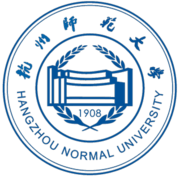Hangzhou Normal University
| 杭州师范大学 | |
 | |
| Type | Public |
|---|---|
| Established | 1908 |
| President |
Dr. Gaoxiang Ye (叶高翔) |
| Location | Hangzhou, People's Republic of China |
| Website | http://www.hznu.edu.cn/ |
Hangzhou Normal University (simplified Chinese: 杭州师范大学); traditional Chinese: 杭州師範大學; pinyin: Hángzhōu Shīfàn Dàxué), or Hangzhou Teachers College, is a public university located in Hangzhou, the capital of Zhejiang Province, China. It is a comprehensive university with an excellence in teacher training and professional development.[1]
Having merged with Hangzhou Education College and Hangzhou Medical Junior College, HNU comprises nine campuses with a combined area of 513,590 m².
HNU has nearly 12,000 full-time students, 9,000 of whom are undergraduates. Of over 1,000 teachers, over 100 have a doctorate degree or are Ph.D. candidates, and 283 have a master's degree. There are nearly 490 professors (researchers) and associate professors (associate researchers).
History
In 1905, the governor of Zhejiang Province founded a teaching school, aimed at training teachers for high schools and primary schools for the entire province. In 1908, the school was named as Zhejiang Official Secondary Normal School (浙江官立两级师范学堂) and located in the original address of Zhejiang Gongyuan (浙江贡院). Shen Junru was appointed as supervisor in 1909.
In 1912, under the guidance of the Education Department of the Republic of China, the school became one of the six well-known higher teacher education schools at that time. It issued its own publications, such as "Baiyang" (白阳) and "Zhejiang Trendy" (浙江新潮), and set up clubs, such as Music Rock Club (乐石社), Lakeside Poetry Club (湖畔诗社), and Mingyuan Club (明远学社). Educationist Jing Hengyi (经亨颐) was the Principal then; famous masters such as Li Shutong (李叔同) and Lu Xun (鲁迅) once taught there; Feng Zikai (丰子恺), Qian Xuesen (钱学森), and Pan Tianshou (潘天寿) once studied in this school.
When the Japanese invaded Hangzhou during World War II, the school was relocated in several places, such as Jiande (建德) and Lishui (丽水), and was moved back to Hangzhou after the war.
The school has been under direct jurisdiction of the Hangzhou Municipal Government since 1954. In 1978, the State Council approved to found Hangzhou Normal College (杭州师范学院), which was approved by Ministry of Education (China) to change its name to Hangzhou Normal University in March 2007.
In 2010, an educational proposal was jointly submitted by Sun Zhonghuan, Zhao Guangyu, Yu Jialing, Zhu Zude and Chen Xiaoping, three municipal officials of Hangzhou. They together suggested changing Hangzhou Normal University to be Hangzhou University, because this university had reached the level of old University of Hangzhou. However, many provincial & municipal officials and dignitaries obviously rejected it. This was a widespreading but resultless proposal in the end.[2]
General information
As the key municipal university, Hangzhou Normal University currently has five campuses, namely, Xiasha Campus (下沙校区), Wenyilu Campus (文一校区), Yuhuangshan Campus (玉皇山校区), Gudangwan Campus (古荡湾校区), and Xianghu Campus (湘湖校区), covering a total area of around 1400 mu (approx. 93.38 hectares). Having acquired a land of about 558 mu (approx 37.22 hectares), the University is building another campus called Cangqian Campus.[3]
Consisting of 18 schools providing 49 undergraduate majors and 39 postgraduate disciplines, the University has 3 majors with features at the state level, 11 key majors and 6 key disciplines at the provincial level, one course of fine quality at the state level, and 18 courses of fine quality at the provincial level. Presently, the school accommodates 18,597 undergraduates and 1,341 postgraduates and employs over 2,100 staffs and faculty members. Among 1,388 full-time teaching faculty, 700 are either professors or associate professors. In addition, 4 honorable co-engaged academicians are engaged to make valuable contributions to the cause of Education.
Hangzhou Normal University is undergoing several major projects: a key laboratory co-built with the Education Department of Zhejiang Province, a group of provincial-level centers for teaching and demonstration centers, National 863 Plan, scientific and technological programs of “10th Five-Year Plan” National Funds of Natural Sciences and National Funds of Social Sciences, etc. The University publishes some periodicals, such as Hangzhou Normal University Journal, Hangzhou Normal University News, and Yuwen Xinpu. Hangzhou Normal University Journal is selected as "Excellent Magazine" in East China and has successionally been listed in the “National 100 Top Journals of Liberal Arts and Social Sciences” for three years.
To facilitate intercultural learning experiences, the University has established academic cooperation programs with more than 30 universities around the globe, comprising the United States, the United Kingdom, South Korea, Japan, Australia, and Philippines.
Adhering to the eight-character school motto "Diligence, Caution, Honesty, Forgiving, Erudition, Refinement, Perfection, and Initiative," all members of the University are carrying forward the cause pioneered by the predecessors and forging ahead for the best and most outstanding comprehensive university in the province and even in the country.
Notable alumni
From education leaders to world's billionaire, from well-known singers to academic researchers, the alumni of Hangzhou Normal University have achieved success in a variety of fields.
- Ma Yun Jack Ma (马云): CEO of both Taobao, one of China's foremost online shopping web sites, and Alibaba Group, one of China's biggest e-commerce companies.[4]
- Lv Wei (吕薇): National First-Class Singer; has had numerous performances in Japan, America, Australia, New Zealand, France, etc.
- Xiaopeng Yan (严晓鹏): Dean, International Cooperation College, Wenzhou University
- Dr. Yeping Li (李业平): Professor and Department Head, College of Teaching, Learning, and Culture, Texas A&M University
- Fuqiang Jin (金富强): President, Allsino Chemicals Co., Ltd.
- Dr. Jinfa Cai (蔡金法): Professor, Department of Mathematical Sciences, University of Delaware
- Feifang Hu (胡飞芳): Professor, Department of Statistics, University of Virginia
- Dr. Xueqiang Ma (马学强): Researcher Fellow, Institute of History of Shanghai Academy of Social Sciences
- Yinyue Hu (胡银岳): Head, the Institute of Musicology of The Central Conservatory of Music
- Xiong Ying (应雄): President, Zhejiang Wanli Education Group
- Shengyuan Xu (徐胜元): Professor, School of Electrical Engineering and Automation, Nanjing University of Science and Technology
- Shumeng Huang (黄书孟): National Second-Class Professor; former Vice President of Zhejiang University